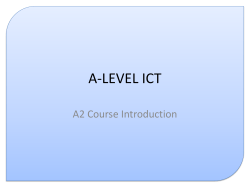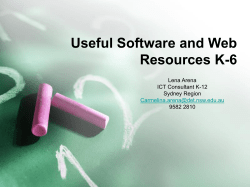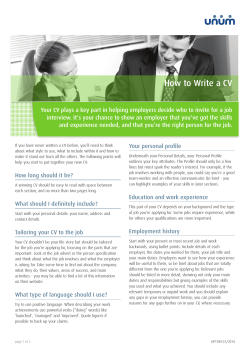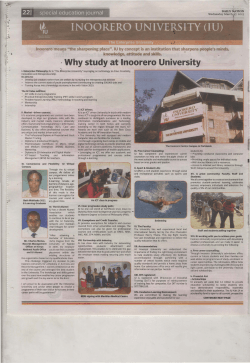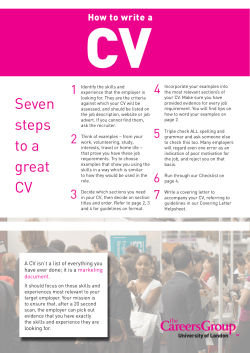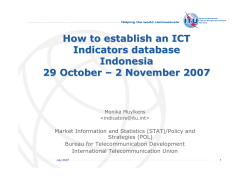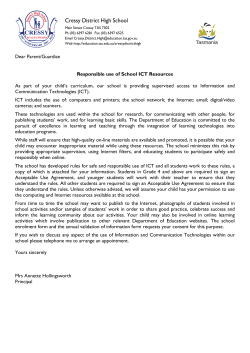
How to Apply for an IT Job Tony Brett
How to Apply for an IT Job Tony Brett Head of IT Support Staff Services Oxford University Computing Services You need to know this • This is all my own opinion and not official advice • It comes from 16 years of experience applying for dozens of jobs and reading hundreds of application forms, covering letters and CVs. • There are no right answers and you’re welcome to interject • But I do know what makes me more or less likely to shortlist people! • This seminar is about applying for a job, it is NOT about recruitment What we’re going to talk about • The Advertisement • The job description/person specification • Selection Criteria – Essential vs. Desirable • The application pack – The application form • • • • • • The CV References The Covering Letter Equal Opportunities Health monitoring/screening Checking and submitting the application The sole purpose of the application • To get you an interview! • To get you shortlisted • You can demonstrate how fab you really are at an interview You can find job adverts all over the place! • • • • Guardian on Thursday Oxford Times Fish4Jobs (Oxford Mail and Times) Jobsite.co.uk – Weekly mailings, CV tips etc. – Can upload CV for prospective employers • Jobs.ac.uk • University: http://www.ox.ac.uk/about_the_university/jobs/ – Mostly academic related but some are research • Colleges: https://weblearn.ox.ac.uk/access/content/group/test1-confcoll/Public%20Documents/college_appointments-job_vacancies.html Online searches save you looking continually • Jobs.ac.uk give you lots of choices – Minimum Salary – Location – Speciality – Frequency of mailings • Other Universities may have their own service – http://www.admin.cam.ac.uk/offices/hr/jobs/notify.html Good adverts catch your eye • They don’t need to be in the passive voice • They should capture your interest quickly We are seeking a new Head of ICT who will manage and develop an ICT function that is appropriate within the context of an international, not-for-profit research organisation working in multiple sites in Africa. You will have a relevant ICTrelated or science degree and substantial experience as a senior ICT manager. Effective change management and leadership skills are essential. Applications are invited for the full-time post of Programme Manager for the XXX programme. This new post is funded by the XXX funding body and is available immediately until December 2014, based in the bad advert Unit at the University of Oxford. Job specification needs careful reading and consideration • Tell you what YOU will be DOING if you are offered and accept the job • Should be task-oriented • Tasks should be specific and discrete • Ask yourself – Can I do this task? (am I competent?) – Do I want to do this task? (am I interested?) • This is about if the job is right for YOU Good job spec is easy to understand and quantify • Develop and implement a strategic plan that ensures the efficient operations of all ICT functions within thE Programme • Recruit, train and re-train current staff as required to successfully implement the strategic plan • Collaborate with the scientific leadership of the Programme through active membership of the Programme Management Committee • Review of all hardware, software and operating systems and procedures within the programme, in collaboration with the ICT Steering Group and other stakeholders and ensure that these are appropriate to support the needs of the Programme. • Responsible for developing the ICT department’s core budget proposals and the management of the ICT department’s budget, to ensure that resources are deployed to best effect and provide value for money. • Development of service level agreements for ICT at the Programme, in consultation with stakeholders. • Be a part of the senior management headed by the Chief Operating Officer and other support units (including Finance, HR, Transport) to support better use of office automation to ensure the smooth operations of the programme Person specification is about you! • Once you’ve decided if the job is for you then you have decide if you are for the job • You have to be honest with yourself here • Lying is not acceptable and could get you dismissed • You need to have evidence to hand of how you fit the criteria laid down in the job details Judgement is based on selection criteria • Many HE jobs are based on selection criteria • Essentials are “must-haves” – Don’t waste your time if you are missing more than one or two • Desirables may differentiate you from others – Don’t worry if you don’t have these – they may be very obscure The instructions for applying are vital • IT folk don’t like reading instructions – But you MUST do it when applying for jobs • Get it wrong and you’ll be filed under B • Watch out for – – – – – – Deadlines Number of copies required Is there an application form Whether a CV will be considered What details to give about referees Word count limits - DO NOT IGNORE! It’s fine to ask questions • Who is on the panel? – Google them – Find out about their interests and skills – Apply appropriately! • • • • • • • Where and when will the interviews be? Will you have to give a presentation? Is it OK to include extra papers? Are word count limits strict? How many copies do they want? Will referees be contacted before interview? Will they pay travel expenses for interview? Application forms are common in HE • • • • • Answer all questions Don’t leave gaps Be careful to fill completely NEVER put “See CV” Do NOT rush or skimp on completing this Mind your language... • Be careful with technical language – – – – OK if it’s in the advert or JD Remember some of panel may be less technical Follow lead on acronyms or simplified words Always explain acronyms on first use • Give context for technical language so it’s clear • I have extensive experience of (many programming languages including)C++, COBOL, JAVA, Visual Basic and Fortran – Without the bit in brackets that might not make sense to a non-technical panel member Lots of details required • Answer questions as asked • Don’t give information not requested • Be honest – lying is bad and could lose you the job • Be concise and don’t waste words • Use competency statements that match criteria – – – – What did you do? What was the context? How do you know you succeeded? Is it convincing? Exercise • In groups of three or four for 5 minutes • Think of a competency statement to address the competency: “Organisational Skills” • Remember – What did you do? – What was the context? – How do you know you succeeded? – Is it convincing? Leaving gaps might make it look like you’ve been in prison... • You MUST cover all gaps in your career • Panels will pick up on vague/evasive answers and might think you’re dishonest • Make sure the story stacks up • You WILL get caught if you lie • Gap years, redundancy, maternity/paternity leave, compassionate leave, sickness leave are all nothing to be ashamed of and are much better declared early • Gaps for education/training are of course fine! • Have gap explanations ready for interview Filling it in completely is essential • Especially if “attention to detail” is listed! Nobody likes a lazy applicant • NEVER just put “See CV” • It shows you can’t be bothered to do what you were asked • Spend time maximising the impact of the form on the employer • It is your ONLY chance to impress them The devil in the detail... • Note carefully selection criteria and address them all! – Cut everything else • Keep it in the box or at least fairly concise – Not with a silly small font ! ABILITIES, SKILLS, KNOWLEDGE, EXPERIENCE & ADDITIONAL INFORMATION: Please give details relevant to the job description with examples of your proven experience in each of the essential and desirable criteria listed. These may have been gained through paid employment, voluntary/community work, domestic responsibilities, spare time activities and training. Include your reasons for applying for this post, and any additional information in support of your application. If necessary please continue on a separate sheet. It’s all about you • Even if you are generally shy and retiring you must remember this • Not “We did this” – Boring narrative • But “I did this, this is how it had a positive impact” – Tells the employer how you can give value Everyone likes a story • Interviews are now based on behaviours • Telling a story can show how you have behaved • Explain: – – – – – – – What point am I trying to make What happened? Why did it happen? Where did it happen? When did it happen? Who was there? What were their names? But get the right plot... • Christopher Booker says there are seven essential story plots – – – – – – – Overcoming the monster Rags to riches The Quest Voyage and Return Comedy Tragedy Rebirth • Which two should you avoid? PREP-STAR works well • Explain Point you’re trying to make • Give Reason why the story makes the point • Give some Evidence – Situation – Task – Action – Result • Repeat the Point you’ve made Exercise • In groups of 3 or 4, for 5 minutes • Write a PREP-STAR story about a key behaviour that might be necessary to show good communication skills – – – – – Writing Public speaking Listening Persuasive Dispute-resolver • Report back to us all You MUST MUST MUST address the selection criteria • This is all the panel is allowed to judge you on • A good story for each of them will go a long way • You can even list them as headings and write a short piece for each • Spend lots of time on this • Get someone else to read it Criteria have qualifiers • Outstanding, superior, excellent, strong, sound – Hyperbole. Reasonably good. Don’t be afraid of using the words • Knowledge, understanding of... – You know what they are talking about; perhaps use details • Demonstrated ability to... – You’ve actually done this. Give evidence, a story • Background in, experience of... – Experience or training (first is better) • Appreciation of... – You’ve heard of it! Dealing with the criteria • Address each criterion carefully • Used different evidence for different criteria • Use positive and unequivocal language – Not “quite good”, “reasonable”, “average” • Work hard to understand what the criteria mean • Watch that your claims are consistent with the rest of your application You can also include a CV • • • • • Sometimes this is all you get to submit Don’t duplicate stuff from application form in CV This not an excuse to be lazy with application form CV should probably be 2-3 pages only Don’t give information that might encourage bias – – – – – – – Children/family situation Age Disability Marital Status/Sexual orientation Religious belief Racial background A picture! (you want to be judged on competencies and experience, not looks!) All I’ve ever wanted to be is... • Career objectives can be useful but not if they start as above! – They should state what you want out of a job – They let the panel know you are serious – Beware of narrowing opportunities • “IT Manager in a busy college where I can develop my management skills with a variety of technical staff” is good Referees are important • Not giving your current employer raises questions • Try to give relevant referees • You have the right to ask employers not to contact referees without asking you first – But still give details as it makes things easier for employer • Get permission from your referees and talk to them about why the job is right for you – Make sure they see the JD including criteria Covering letter needs to create a good first impression • • • • • Quite often the first thing the panel sees Sets the tone NEVER more than one page Should not repeat application form or CV Should include: – – – – – – – – Contact details including postal, phone & email Job applied for Reference number Where you saw the advert Why you are applying Why the job is right for you A request for a reply Your handwritten signature and your typed name below Customise always! • Tailor application, CV and letter to the specific job • Think carefully about having your CV on a job site • May be better to send it to employers on request or response to a specific advert The University welcomes diversity amongst its staff... • • • • The monitoring form is optional But it’s good to fill it in Employers have a legal duty to complete it Don’t include in a PDF or on the back of anything else • Equal ops form will NOT be seen by panel Your health is private... • You might be asked to fill in a form – Maybe after shortlisting • Should be returned in its own sealed envelope • Employer should return it to you unopened if you are unsuccessful in application You can’t proof-read your own work • So don’t even try! • Get a non-IT person to read application – Revise/re-word anything they don’t understand • Get a trusted colleague to proof-read it – Listen and act on suggestions • Have a final look and make sure presentation looks OK – Not too many or too unusual fonts and sizes – No gaps – How would you feel if you got this as an application? Be careful to follow instructions for submission • Send a PDF with pages in the right order if you can – Don’t include equal ops form • Gives you control over what people read first Submit it and good luck! • Make sure you don’t miss the deadline – If you know you will miss it ask for an extension first! • If you are not shortlisted politely ask for feedback – Never send abusive letters or emails or make abusive phone calls – You might want another job there in the future! • Good luck! References • “Brilliant CV”, Jim Bright and Joanne Earl, 2008 (3rd Ed), Pearson Education Limited • “The seven basic plots: Why we tell stories”, Christopher Booker, 2005, Continuum International Publishing Group Ltd
© Copyright 2025



